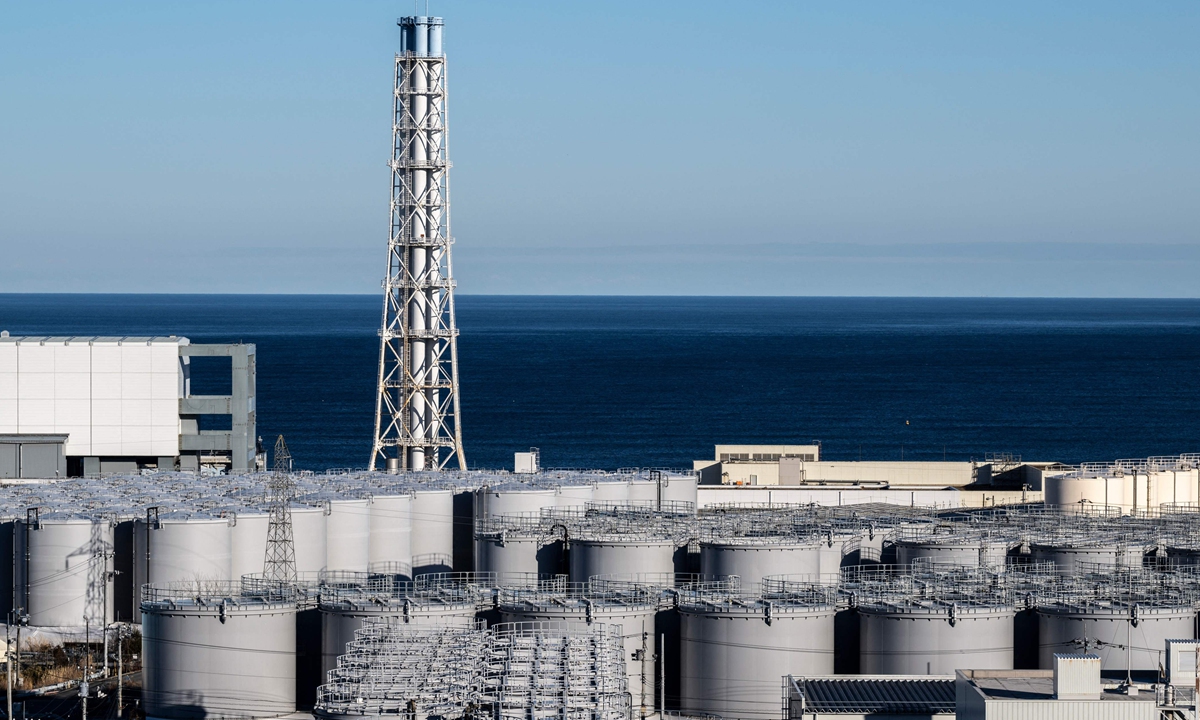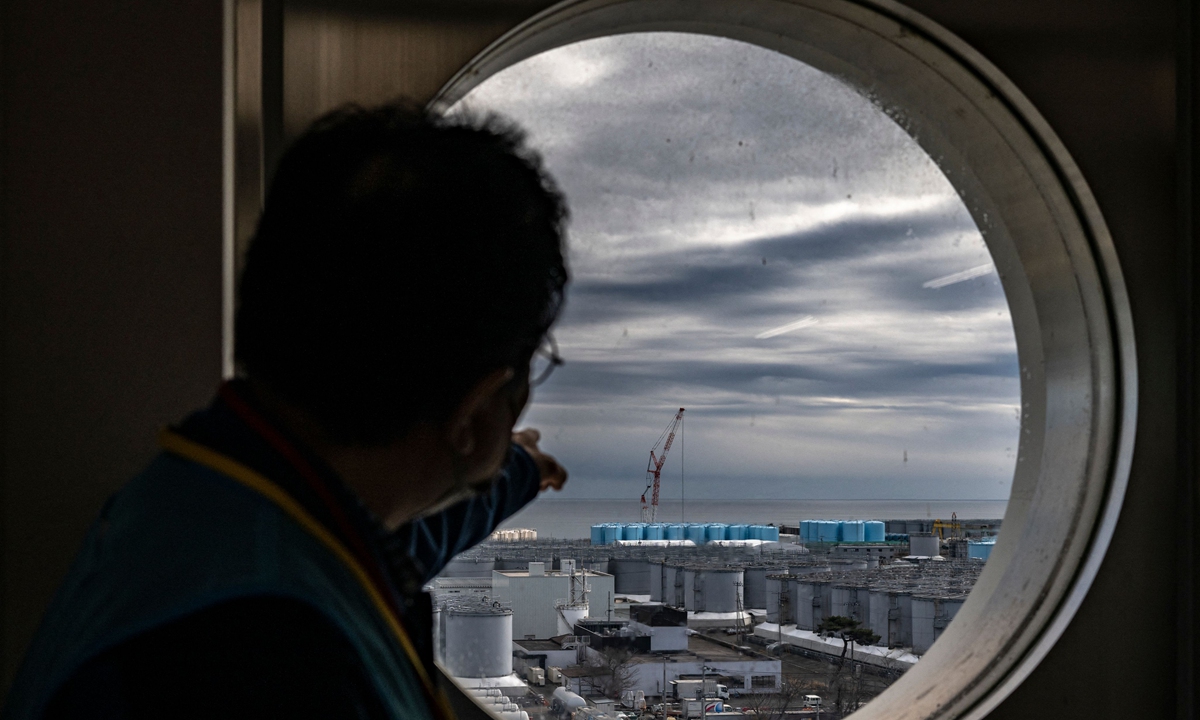
Tokyo Electric Power Company's (TEPCO) Fukushima Daiichi nuclear power plant in Okuma, Fukushima prefecture Photos: VCG
Editor's Note:
Days after the 12th anniversary of the Fukushima nuclear disaster, Japan began making preparations for a nuclear-contaminated wastewater dumping from the Fukushima Daiichi nuclear power plant.
Despite strong internal opposition, and oppositions from its neighbors and the international community, Japan still intends to dump more than 1 million tons of irradiated water into the Pacific Ocean in the spring or summer this year, the Japanese government confirmed in January.
This is the first of three installments by the Global Times to examine the expected tremendous economic impacts of the Japanese government's reckless decision, including huge damages to its nuclear industry, its agricultural exports, as well as the fishery industry in Pacific countries.
Japan's restarting of its nuclear plants despite safety concerns could tarnish its reputation as a nuclear power operator, Chinese experts said, as Japan commenced the operation of equipment needed for its nuclear-contaminated wastewater dumping plan for the first time on Friday at its crippled Fukushima Daiichi nuclear power plant, and a prelude to the wastewater's final discharge into the open ocean.
The movement also brought Japan's re-embracing of nuclear energy to the fore, with Japan's Cabinet formally adopting a policy in February to allow the operation of nuclear reactors beyond their current 60-year limit alongside the building of new units.
While restarting nuclear power plants will help Japan address its energy-shortage problem and pursue low-carbon development, restarting these facilities under current circumstances has sparked concern and opposition from both within the island nation and the international community, Chinese experts noted. Restarting nuclear power plants in such a reckless fashion threatens to intensify distrust of Japan's nuclear power technology by the international community.
Chinese experts said people around the world are probably asking "can Japan rely on its own nuclear power technology to avoid another Fukushima-level nuclear leakage accident," given the fact that most of Japan's nuclear power plants are decades old and that Japan's geographic location means the country falls victim to frequent natural disasters including earthquakes and tsunamis.
Japan announced its plans to restart as many nuclear power plants as possible in December 2022, walking back its pledge to phase out atomic power, according to media reports.
Currently, 10 nuclear reactors have resumed operation while 17 are in the pipeline in Japan.
Tarnished int'l reputation
Although some polls by the Japanese media reports show that the proportion of those "supporting" the return of nuclear power has gradually surpassed that of those "opposing" the move. Chinese experts said that the Japanese people's hope to use nuclear power is mainly due to people having shouldered high energy prices in 2022 but it cannot be fully ascertained that the Japanese people have fully accepted a return to nuclear power, or the belief that nuclear power and nuclear power plants are safe.
Japanese people's concerns about nuclear power are demonstrated in their protests and rallies against the Japanese government's return to nuclear power and the discharge of nuclear-contaminated water into the sea, they noted.
The Kishida administration's instance upon restarting of nuclear facilities, regardless of public opinion and opposition parties' objection to the practice of extending the safe use period instead of taking other measures, will lead to the international community questioning whether Japan's nuclear power technology has made any progress at all since the disaster, Chen Yang, a visiting researcher at the Institute of Japan Studies, Liaoning University, told the Global Times on Sunday.
Before the Fukushima nuclear disaster, Japan had full confidence in its nuclear technology. However, a shadow of doubt was cast by the Fukushima nuclear leak, with Japan's domestic population and people from neighboring countries all expressing concerns over Japan's nuclear technology, severely damaging Japan's global nuclear reputation, experts said.
"After Fukushima and its huge devastation and far-reaching impact, no matter how much the Japanese government tries to highlight its advanced nuclear power technology and the safety and stability of its nuclear power plants, it may be difficult to guarantee that there will be no other Fukushima-like incident in the future," Chen said.
Japan's irresponsible course of action over the dumping of nuclear-contaminated wastewater into the sea has only served to further erode international confidence in Japan's nuclear capabilities, experts noted.
China, along with Russia, presented a joint list of technical questions to Japan over its unilateral decision to dump nuclear-contaminated wastewater into the sea in November 2022, but the Japanese side failed to answer either by distorting concepts, evading crucial parts of the process, or even declining to speak on the matter, Chinese officials said on Thursday.
On the environmental front, Japan has approved the construction of dilution and discharge facilities for nuclear-contaminated water when the International Atomic Energy Agency has neither completed its assessment of Japan's disposal plan nor drawn specific conclusions.
Reckless moveThe lack of relevant authorities in the nuclear field casts further doubt over Japan's capability to deal with a disaster similar to Fukushima in a timely manner once such an incident potentially occurs in the future, experts said.
According to the Sankei News, roughly one-fifth of the employees joined the industry after Fukushima incident and they lack operational experience.
Lin Boqiang, director of the China Center for Energy Economics Research at Xiamen University, told the Global Times on Sunday that existing unused nuclear facilities, sit there like a set of irresistible attractions.
"Nuclear plants need a huge front-end investment but once it is completed, the maintenance cost is quite small and letting these facilities sit idle is quite costly," Lin said, noting the temptation faced by the Japanese government.
Lin said without the support of the Japanese government, Tokyo Electric Power Company - the operator of the Fukushima Daiichi nuclear power plant, would have gone bankrupt long ago.
Despite facing strong objections from its neighbors, Japan plans to seek the endorsement of the G7 nations for its plan to dump the nuclear-contaminated water when it hosts a meeting of the group's energy ministers in April, the Japanese Times reported in February.
At a press conference on March 14, Chinese Foreign Ministry spokesperson Wang Wenbin warned Japan not to start discharging nuclear-contaminated water into the ocean before reaching a consensus through full consultation with neighboring countries and other stakeholders, as well as relevant international agencies.

A risk communicator gestures toward storage tanks holding contaminated wastewater at the TEPCO Fukushima Daiichi nuclear power plant on January 20, 2023. Photos: VCG





